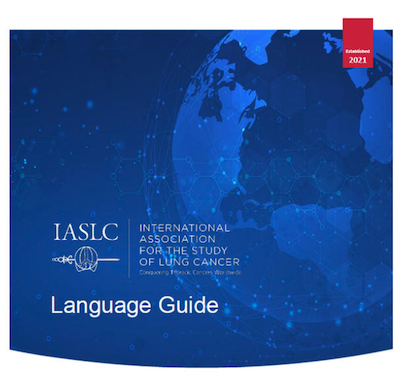Words Matter: The IASLC Language Guide
Words are powerful and important. They create perceptions that shape our beliefs, attitudes, and behaviors. So when we use words to describe and categorize people they become labels. Some labels are good, but some are harmful and spark judgment and biases, which lead to prejudice and discrimination.
Unfortunately, there is a strong culture of blame with lung cancer that you don’t see with other cancers, so language matters even more. The words and phrases we all use to write and speak affect the images and attitudes formed about people with lung cancer.
Introducing IASLC's Language Guide
The International Association of Lung Cancer (IASLC) recognizes that stigmatizing language can affect the care provided to patients, impact the attitude of other health care providers towards the patient, and can adversely impact health outcomes. To align with their goal of reducing the burden of lung cancer on patients and their families, IASLC recently published a Language Guide.

I was fortunate to be the lead on the project, but it was a collaborative effort from many people and disciplines. The guide was created to encourage members to use person first, stigma-free, blame-free, equitable, and inclusive language. We believe it is an important step in the ongoing process of increasing respect and unity throughout the lung cancer community.
IASLC's four simple principles
- Use person-first language. For example, instead of "lung cancer patient" use "patient/person with lung cancer."
- Eliminate blaming language. For example, replace "patient failed treatment" with "treatment failed patient."
- End stigma. For example, instead of "smoker" use "person who smokes."
- Equity. Follow best practices regarding race, ethnicity, gender, socioeconomic, and geographic descriptions to promote cultural humility and sensitivity.
A guide to raise awareness and change the conversation
The guide is not an exhausted list of dos and don'ts, and it's not meant to shame anyone. It's meant to raise awareness, (we believe that most aren't even aware of the harmful impact that certain words and phrases can have on people) and to be a resource for all stakeholders in the community, and the general public. Like research and treatment, the language we use needs to advance, evolve, and be more empathic and non-judgmental.
Medical language is rooted in tradition, and historically it was used to describe cancer, but over time many of the words and phrases have become stigmatizing, degrading, and harmful. There was a time when patients didn’t attend conferences, we didn’t read research journals or clinic notes after our visits. We weren’t on social media and we didn’t have access to clinicians and scientists. But times have changed. We are attending conferences now and we listen to, and hang on to, every word said because our lives literally depend on research.
We are more than a medical label
But the guide is also for us, advocates. It’s a reminder that using labels (smoker, non-smoker) defines us by a single story. There is so much more about our complex and rich lives that make us who we are. Cancer is complicated. There is no simple cause and effect and regardless of how we got lung cancer, no one deserves it.
The pain from watching someone you love suffer through the cruelty of lung cancer until their last breath is unbearable, so does it really matter whether or not they smoked? Does it mean that they deserved to die? Does it minimize the loss? Do those left behind deserve less sympathy?
It doesn’t matter! What matters are people. Using words that help, not hurt, matters. Empathic, guilt-free care and acceptance in the community matter.
Our perceptions about lung cancer change with our words
Change and progress don’t happen overnight, and we all make mistakes. That’s ok! The important part is that we correct ourselves. These small changes have the potential to impact patient care and promote a level of understanding in the community. All people with lung cancer and their families deserve empathy, respect, and humane compassionate care.
The perception of lung cancer won’t change unless we stand up, speak up and act to change it. Now is the time to make a conscious commitment to changing our own thinking, actions, and the conversation surrounding lung cancer. Only then can we educate others, kill the stigma and save lives.

Join the conversation